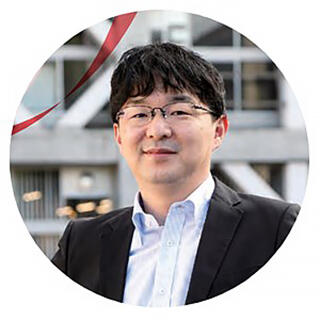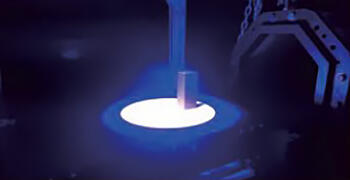
Q1. What are your interests?
A1. Observing flow fields with molecules. It was so interesting that I immersed myself in research.
I worked at Niimi Tomohide's lab at Nagoya University and was involved in research to measure the "flow of air," which you normally cannot see, using shining molecules, and I was fascinated by its beauty. I specialized in a field of mechanical engineering called hydrodynamics, but I made significant progress in my research by incorporating a chemical technology called shining molecules, which is different from traditional mechanical engineering. I also broadened my horizons, and engrossed in research, I found myself walking along the path of a researcher.
"Since the flow of air cannot be captured by the naked eye, I used to release smoke and measure with 'points' using sensors." With the optical measurement method called pressure-sensitive paint (PSP), we can now analyze the distribution of the flow in detail on the "surface" by utilizing the phenomenon of emission intensity changing according to the ambient pressure. In our study published in July 2021, we were able to make measurements also under conditions that were previously difficult with PSP, such as when pressure changes are small. We believe that this will enable us to accurately understand air flows in railway vehicles, home appliances, etc. If this kind of application becomes possible, it will help obtain useful information for product design.
Q2. What do you consider important in your research?
A2. It is important to have perspectives and ideas different from those of other people. To actively absorb knowledge from other fields.
In order to produce results through friendly competition among researchers in various fields, I believe it is important to have unique ideas and try things that other people are not doing. What is important is to collect information in my research field along with active collection in other fields. My interest in information science and information measurement using mathematical models led to the research results I mentioned earlier.
Since my student days, to make effective use of the information I gather, I have been "reading basic texts outside my field." By building a strong foundation, information can be used in a variety of situations, making it easier to understand the content, even while reading papers from other fields. Of course, I sometimes re-read basic textbooks in my field of expertise. I think there are big merits to reviewing the basics, such as deepening the understanding of things that could not be understood as a student and being able to discover issues that could not be seen then.
Q3. What kind of research do you want to be engaged in 10 years from now?
A3. I want to establish an original measurement method that combines information science and fluid science.
Science is a repetition of always being interested in and questioning phenomena that occur in experiments, conducting research to clarify them, and hypothesizing and publishing new theories. We hope that our original measurement methods will help us discover new phenomena and provide opportunities to understand other complex ones. In the area of PSP research field, that I specialized in, we had organic chemistry in the beginning and are now seeing a fusion with information science. However, from now on, I think it is also important to go back to the basics and collaborate with those who are studying the specialized field of the basic theory of fluids. My goal is to accumulate thoughts from all perspectives as well as apply ideas and a pioneering spirit, while focusing on establishing a "new measurement method" that is uniquely mine.


Profile:
You Matsuda
Born in Shimane Prefecture.
Doctor of Engineering from the Graduate School of Engineering, Nagoya University, in 2008.
He previously worked as an assistant professor at Nagoya University; the EcoTopia Science Institute, Nagoya University; and at the Institute of Materials and Systems for Sustainability, Nagoya University, before taking up his current position in 2018.
He became a pioneering scientist the same year.




